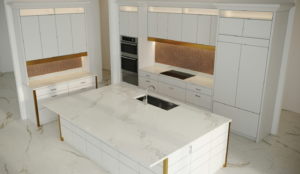By George House/10,July,2025

So you are caught up in the plethora of patterns, material types and colors when it comes to selecting the best floor tiles for your home. You are not alone, because this is a general problem that many homeowners have also experienced.
Flooring tiles have become an integral component of home designs with endless possibilities. They give an endless aesthetic appeal to other materials in your building.
It doesn’t stop there, flooring tiles are in different ranges and kinds, including the widely acclaimed vinyl floor tiles, porcelain floor tiles, ceramic floor tiles and many others. This article explains the different types of floor tiles and guides you through making the best choice for every room in your home. Let’s get to it.
1. Ceramic Floor Tiles
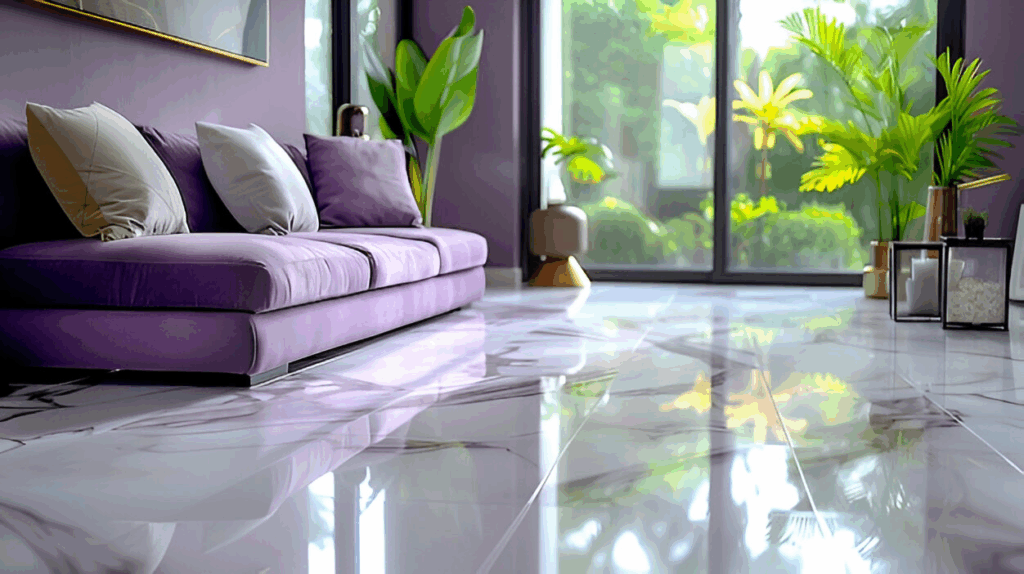
- Best for: Every room in the house. Kitchens, bathrooms, hallways, whatsoever places.
- Pros: Very Affordable, Easy to clean, water-resistant and durable.
- Cons: Can chip under heavy impact
Ceramic tiles can be described as nature’s gift because of their manufacturing materials and processes. These include a mixture of natural clay, minerals, and other earthen materials, moulded into various tiled shapes and fired at more than 1000 degrees Fahrenheit after drying.
Ceramic tiles are modelled in a variety of styles depending on where you intend to use them. The bulk of its classification revolves around its coefficient of friction rating, which explains how much ceramic tile varieties are resistance to slips.
For flooring in the home, it is best to go for ceramic tiles with a COF of .50, which shows less slipping. The lower the COF, the drier and slip-resistant they are.
2. Porcelain Floor Tiles
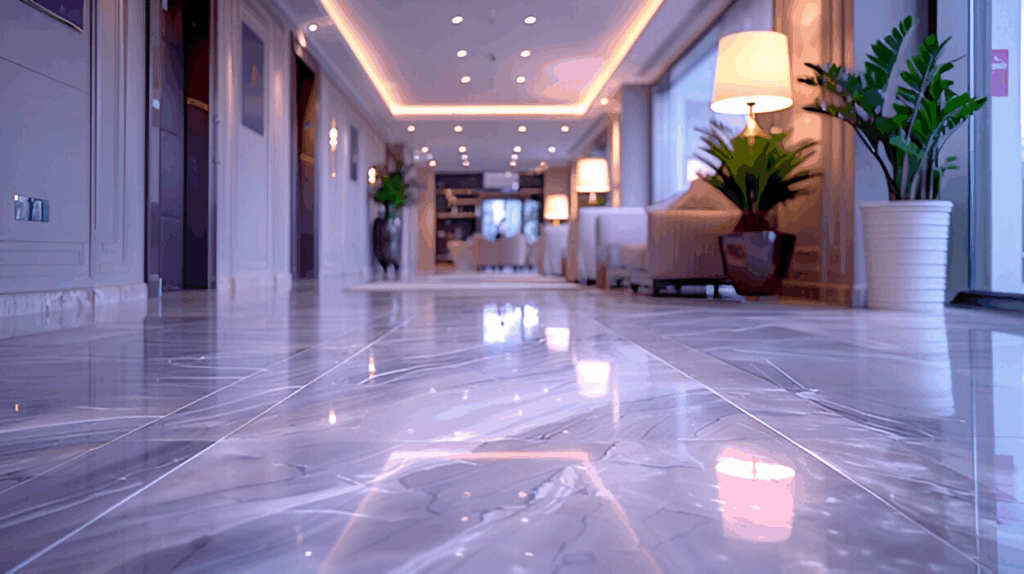
- Best for: High foot traffic areas like the kitchen, bathroom, entryways and any commercial area.
- Pros: scratch-resistant, luxury appeal, impervious (absorbs little water)
- Cons: Heavier and harder to cut
Porcelain tiles are the luxurious version of ceramic tiles. Manufacturers produce them from refined materials such as kaolin, felspar, and white clay. These materials are mixed, dried, and fired at 1200 degrees. The process yields very strong porcelain tiles, which then undergo other finishes and polishing to become glazed, full body, or colored body porcelain tiles.
Glazed porcelain is a white variant; you can choose decorative finishes for it based on your preference. Full-body porcelain tiles are unglazed and remain just as the manufacturer made them. Coloured body porcelain tiles, on the other hand, have colours applied and also get decorative finishes.
3. Vinyl Floor Tiles
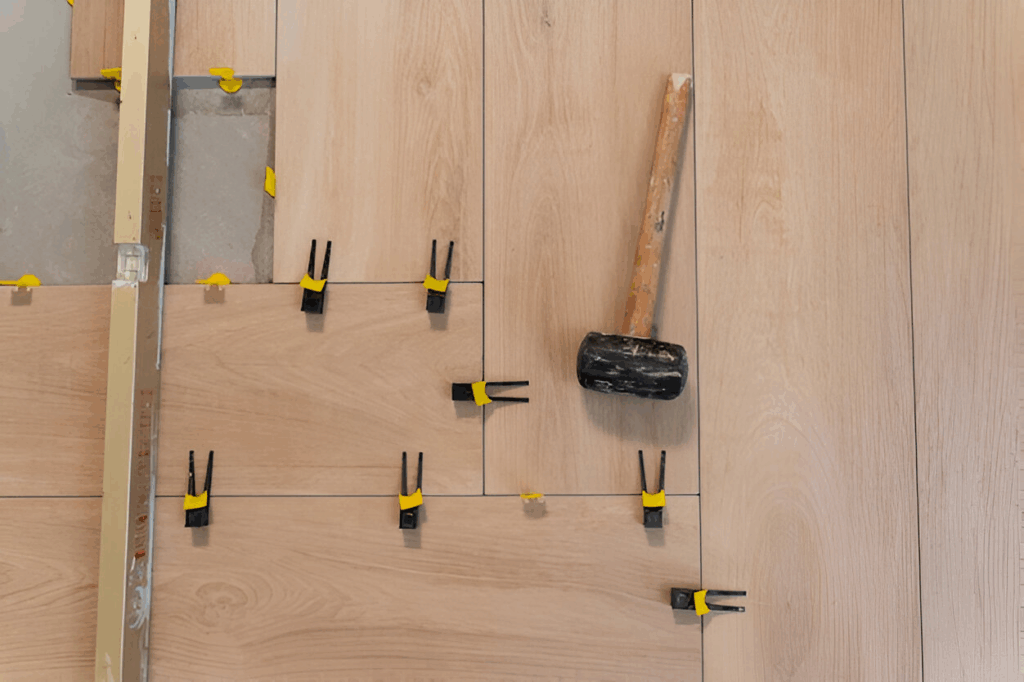
- Best for: High Moisture areas, living rooms, bedrooms, basements
- Pros: Soft cushioned lunderfoot, waterproof options
- Cons: May fade over time with sun exposure
Vinyl floor tiles are the rave of the moment, and every homeowner and business is buying them. The reason is plausible, considering their cost-effectiveness, durability, range of designs, and luxury looks.
The manufacturing principle of vinyl floor tiles is simple in the sense that they are made from inorganic compounds, primarily polyvinyl chloride (PVC), which are subjected to various processes to form multilayer vinyl flooring tiles in designs like chevrons, timber or wood, stone-looking and others.
4. Marble Floor Tiles

- Best for: Bathrooms, foyers, entryway
- Pros: Elegant look, increases home value, extremely smooth finishes, better suit to warm weather conditions.
- Cons: Expensive, porous and high-maintenance
When you think of timelessness and luxurious living when building your home, marble flooring tiles should be at the top of your options. Marble floor tiles are pure natural stone formations that have withstood heat and pressure from sunlight and rain for centuries.
Marble floor tiles occur in a different spectrum of colours and textures, and there have never been two identical marble slabs. These properties set marble floor tiles apart and have endeared them to homeowners and business owners who value luxury and distinctive flooring designs for their homes and business areas.
5. Granite Tiles
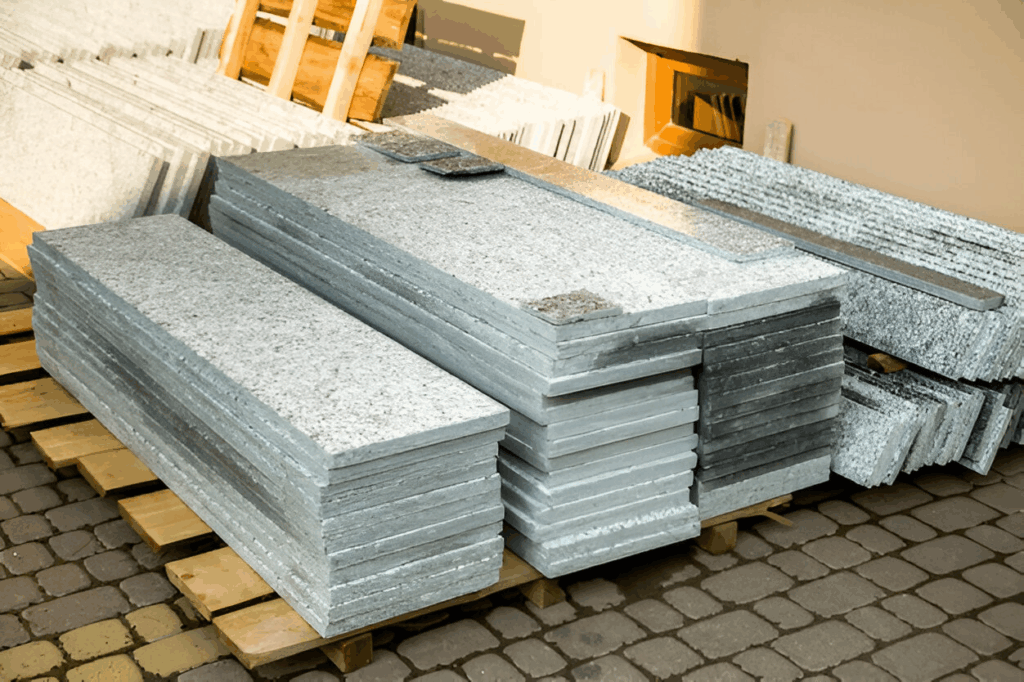
- Best for: Kitchens, utility rooms
- Pros: Scratch and heat resistant, increases home resale value
- Cons: Heavy, requires sealing
Granite tiles are another beautiful piece of flooring tiles that many have used in adding prestige and charm to kitchens, utility rooms, lobbies and hallways. Like ceramic flooring tiles, granite tiles also belong to the hard tiled material family, thanks to their manufacturing processes.
Manufacturers make granite tiles from large granite blocks extracted from quarries. They cut these blocks into slabs, treat the surfaces, and cut the polished edges into desired sizes—usually around 12×12 inches or larger.
One major downside of granite flooring tiles is that they can be slippery. This is because of their non-porous nature and smooth surface. So, for homeowners who are looking for non-slip granite tiles, it is advisable to choose the honed or flamed granite finish that has more grip and texture.
6. Slate Floor Tiles
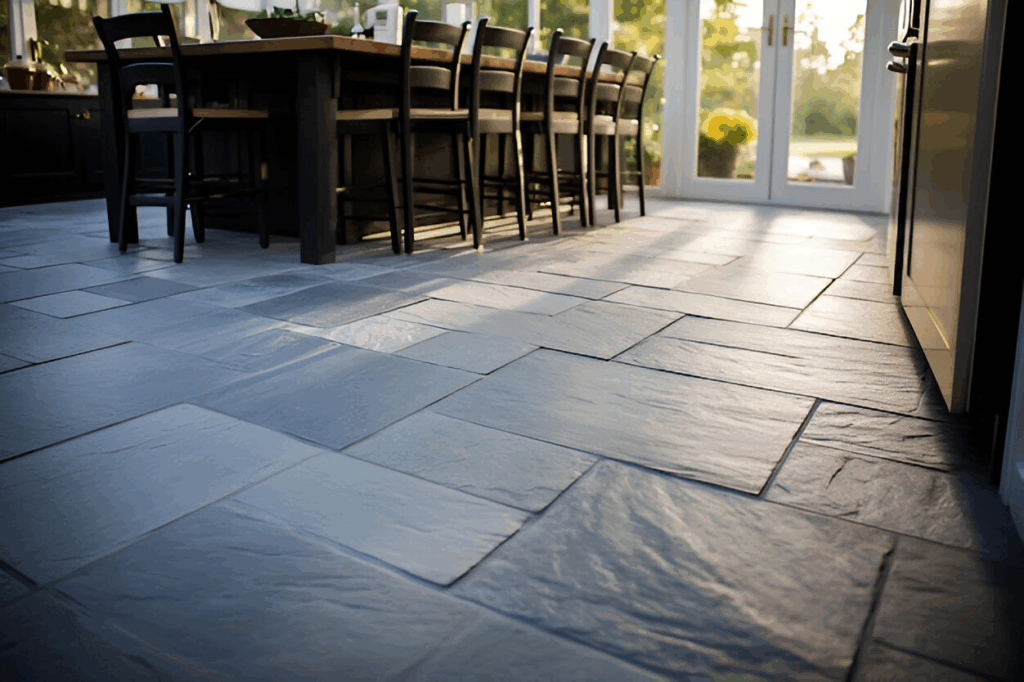
- Best for: Patios, kitchens, mudrooms
- Pros: Slip-resistant, durable
- Cons: Uneven surface can be tough to clean
Slate is another natural stone with an incredible depth of uses in patios, mud rooms, kitchens and other high-traffic areas. Not only is slate beautiful and durable, but because of its incredible textures, it is also naturally moisture-resistant.
Slate tiles are manufactured from slate quarries using various mining methods and extreme precision techniques. After mining, slate is cut into slabs with diamond-tipped blades, which are then split into specific thicknesses before being trimmed into different formations and uses.
It is importance to note that slate tiles are another natural stone that might require regular sealing and other maintenance to avoid water penetrations and stains in the long run.
7. Travertine Floor Tiles
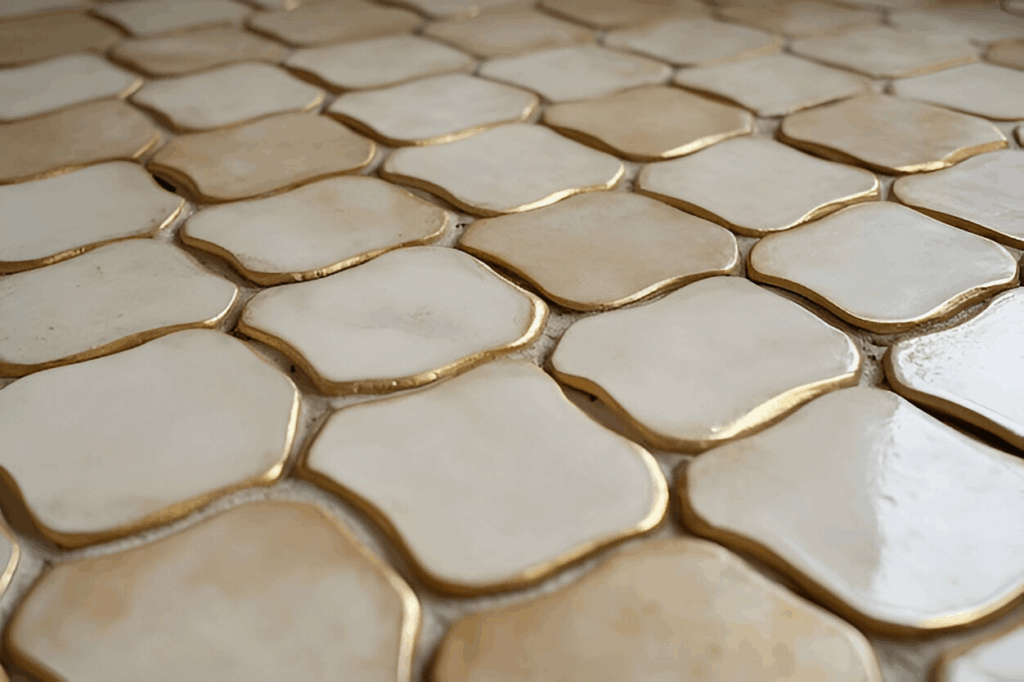
- Best for: Living rooms, bathrooms
- Pros: Elegant, natural finish, heat resistance and versatile.
- Cons: Needs regular sealing, sensitive to acidic cleaners
If you’ve been to a mineral spring in Mammoth Hot Springs at Yellowstone National Park, you might have encountered a heap of terrestrial limestone deposits. Travertine floor tiles are made from such limestone rock formations, which are then quarried in large blocks and sliced into various sizes.
With proper maintenance, travertine floor tiles are durable and timeless. They have various colour gradients and playful patterns that elevate your indoor or outdoor space.
Traditionally, travertine tiles are primarily used for outdoor spaces like exterior walkways, pool decking and the like. But nowadays homeowners have integrated them in their indoor flooring with the introduction of sizes of those tiles around ½ inches (12mm) thicknesses with dimensions between 12/12, 12/24, 16/16, up to 24/24 inches. Remember, this is another natural stone that requires constant sealing and can be prone to acidic cleaners.
8. Mosaic Floor Tile
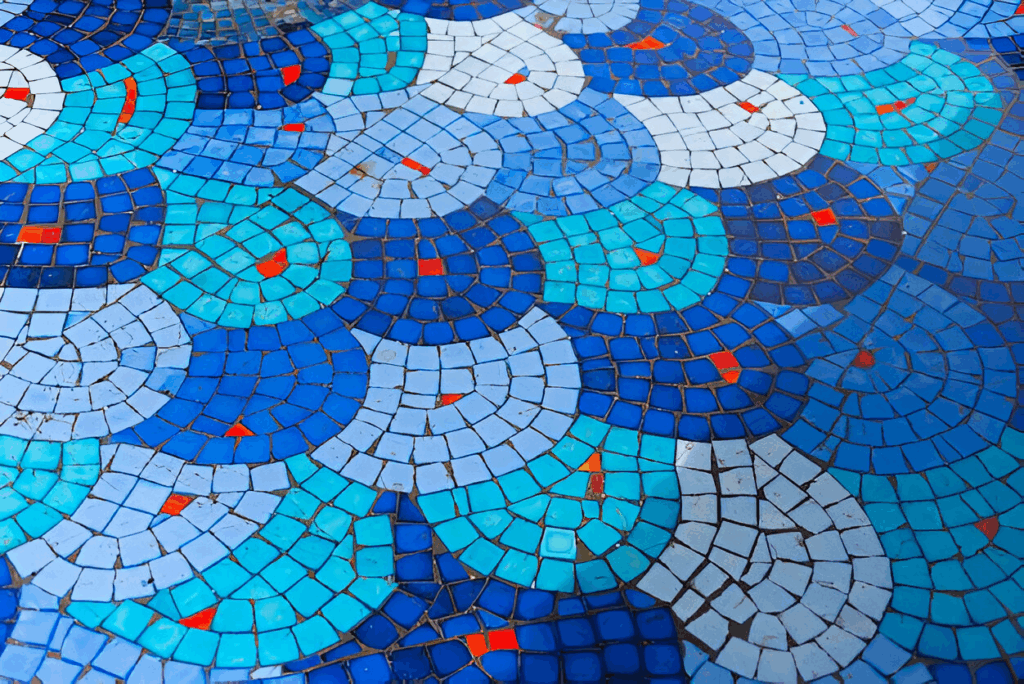
- Best for: Bathroom floors, kitchen backsplashes, shower areas
- Pros: Eye-catching designs, great for small areas or accents
- Cons: Requires more grout, can be slippery if not textured.
The antecedent that surrounds mosaic tiles exudes lustrous beauty and has been around for more than 4,000 years. Mosaic tiles come in different versions: glass, porcelain, stone and ceramic. Each version is named by its base materials, which are cut into small square cubes and meshed together to form patterns like brick-shaped, pebble-shaped, and rectangular.
Mosaic tiles are primarily used in outdoor designs like backsplashes, floor-to-wall tiles, and showers because they are waterproof and durable enough to withstand water splashes. Although mosaic tiles require more grout lines (space between tiles), which makes them not advisable for full indoor flooring, they can still be a good fit for small spaces in the home, like decorative borders and accent areas.
9. Encaustic or Cement Floor Tiles
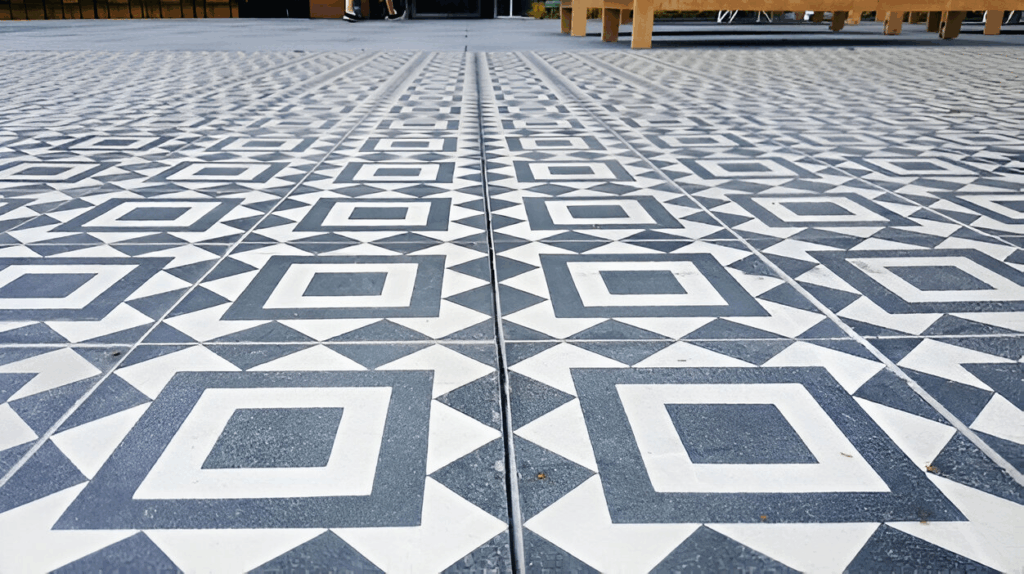
- Best for: Entryways, accent floors, kitchens
- Pros: Unique aesthetics, customisable
- Cons: High maintenance, needs sealing
Cement or Encaustic tiles are beautiful handcrafted blends of natural elements like marble powder, marble granules, and colour pigment that are weighed and mixed with water.
Cement tiles were first introduced in the late 1800s in Catalonia, Spain, and have been widely accepted worldwide because of their unique, elaborate designs, which perfectly complement outdoor and indoor use, including stairway risers, accent surfaces and other high-traffic areas like entryways and hallways.
10. Terracotta Floor Tiles
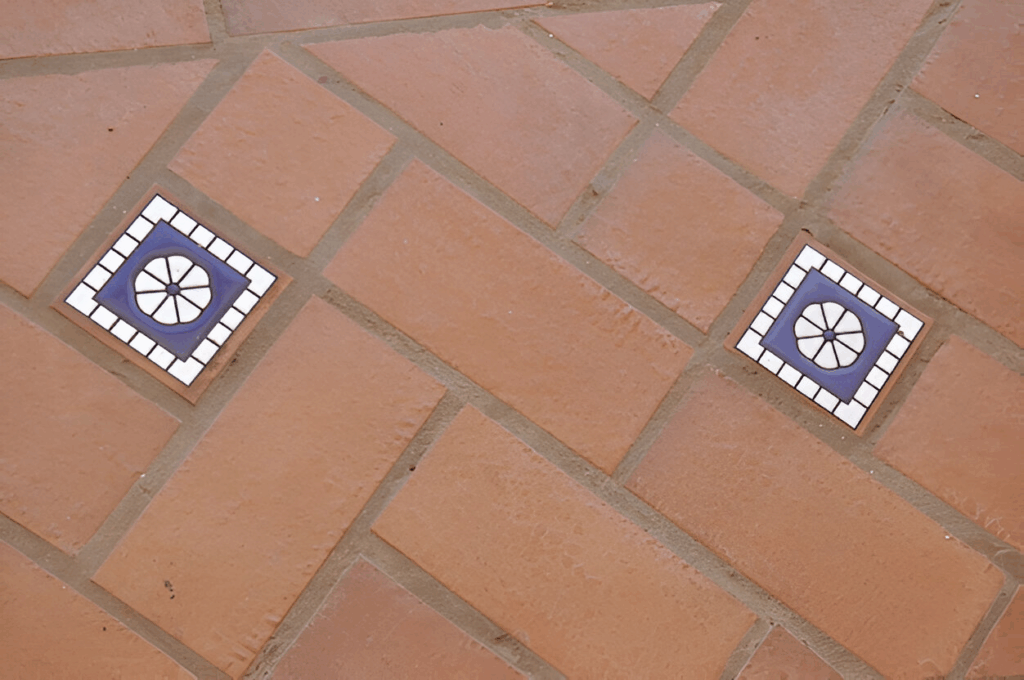
- Best for: Sunrooms, Mediterranean-style homes
- Pros: Eco-friendly, rustic charm
- Cons: Porous and prone to staining
Terracotta or baked earth are types of ceramic tiles made from natural clay that has been fired in a kiln at extremely high temperatures until it maintains hardiness. Terracotta floor tiles have transcended into a thing of more than home designs.
These floor tiles have become culturally significant with their rustic natural elegance, which is widespread in Mediterranean culture. Terracotta is often used in luxurious homes and villas. Despite its eco-friendly nature, terracotta is porous, prone to staining and requires regular cleaning and maintenance.
How to Choose the Right Floor Tile for Each Room
Are you considering utilising any of the above-listed floor tiles in your home or trying to refloor your interior and exterior? We understand how tricky making a choice can be. The following are some topics that can help you narrow down your choice and make the right flooring tile decision.
- Understand everything about each type of tile, such as their moisture resistance properties, grout levels, advantages and disadvantages.
- Check for the correct sizes that best suit your home. Large-sized floor tiles are best for living room areas, while small sizes are appropriate for bathrooms and kitchens.
- The finishing type of tiles indicates their slip resistance properties. Gloss-finished tiles reflect light and can become extremely slippery when wet, while matte-finished flooring tiles are non-reflective and slip-resistant.
- Tile purchasing and installation can be tricky at times. Ensure you only purchase your tiles from reputable manufacturers like George Group, which offers a diverse product portfolio tailored to your architectural style.
FAQ
Which type of tiles is best for flooring?
Ans: Porcelain and ceramic tiles are mostly considered the best choice for flooring due to their durability and variety in style.
What is the easiest floor tile to maintain?
Ans: Ceramic tiles are the best choice for low maintenance.
What is the most durable type of floor tile?
Ans: Porcelain tiles are the most durable type of floor tile because they are resistant to wear, scratches and moisture.

